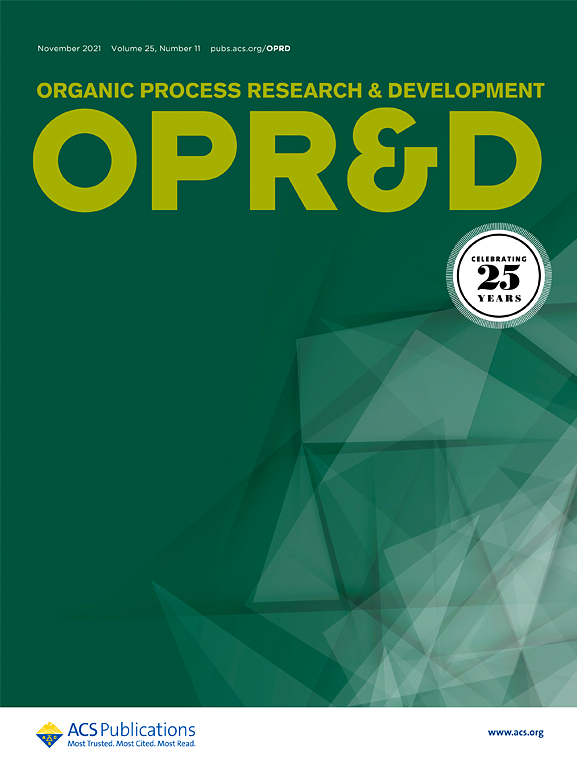氨直接不对称还原胺化反应的开发与规模化
IF 3.1
3区 化学
Q2 CHEMISTRY, APPLIED
引用次数: 13
摘要
直接不对称还原胺化反应是一种将酮转化为α-手性伯胺的有效方法,但报道的例子非常有限。我们描述了两组钌催化条件的发展,用于芳基甲基酮直接转化为药学上相关的手性伯胺。在NH3、NH4Cl和H2的存在下,一种容易获得的dbm - segphos钌催化剂可以在数千克尺度上制备出所需的手性伯胺,其ee含量为93%。本文章由计算机程序翻译,如有差异,请以英文原文为准。

Development and Scale-Up of a Direct Asymmetric Reductive Amination with Ammonia
Direct asymmetric reductive amination represents an efficient means of converting ketones to α-chiral primary amines, but reported examples are very limited. We describe the development of two sets of Ru-catalyzed conditions for the direct conversion of an aryl methyl ketone to a pharmaceutically relevant chiral primary amine. In the presence of NH3, NH4Cl, and H2, a readily available dtbm-Segphos ruthenium catalyst can be used to prepare the desired chiral primary amine with >93% ee on multikilogram scale.
求助全文
通过发布文献求助,成功后即可免费获取论文全文。
去求助
来源期刊
CiteScore
6.90
自引率
14.70%
发文量
251
审稿时长
2 months
期刊介绍:
The journal Organic Process Research & Development serves as a communication tool between industrial chemists and chemists working in universities and research institutes. As such, it reports original work from the broad field of industrial process chemistry but also presents academic results that are relevant, or potentially relevant, to industrial applications. Process chemistry is the science that enables the safe, environmentally benign and ultimately economical manufacturing of organic compounds that are required in larger amounts to help address the needs of society. Consequently, the Journal encompasses every aspect of organic chemistry, including all aspects of catalysis, synthetic methodology development and synthetic strategy exploration, but also includes aspects from analytical and solid-state chemistry and chemical engineering, such as work-up tools,process safety, or flow-chemistry. The goal of development and optimization of chemical reactions and processes is their transfer to a larger scale; original work describing such studies and the actual implementation on scale is highly relevant to the journal. However, studies on new developments from either industry, research institutes or academia that have not yet been demonstrated on scale, but where an industrial utility can be expected and where the study has addressed important prerequisites for a scale-up and has given confidence into the reliability and practicality of the chemistry, also serve the mission of OPR&D as a communication tool between the different contributors to the field.

 求助内容:
求助内容: 应助结果提醒方式:
应助结果提醒方式:


